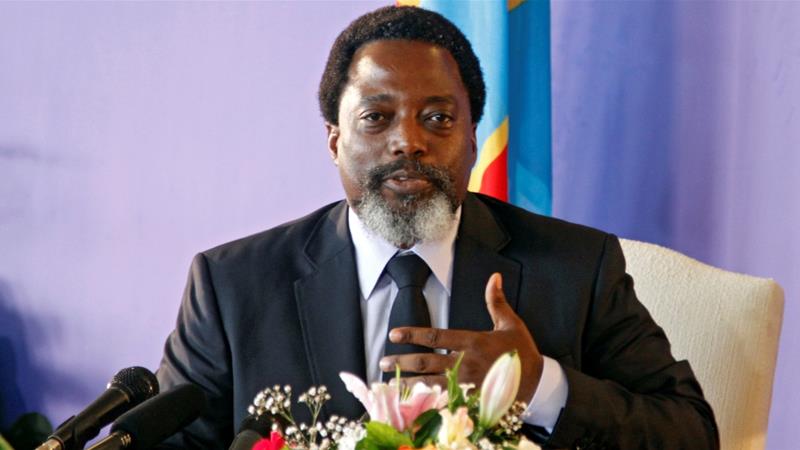DRC elections: The hopefuls, the promises and the ghost of Kabila
A ruptured opposition coalition, new alliance and hand-picked successor for long-term leader Kabila set to contest vote.
There was no shortage of smiles and cheers as Felix Tshisekedi and Vital Kamerhe on Friday made their way into a room packed with cameras in Nairobi.
But as soon the two Congolese opposition stalwarts took to the microphone to announce their decision to join forces in the country’s long-delayed December 23 presidential election, the jubilation could also be felt far beyond the Kenyan capital.
The news prompted scenes of joy in Kinshasa, the capital of the Democratic Republic of Congo (DRC) thousands of kilometres away, where the politicians’ supporters took to the streets to celebrate the freshly-formed partnership.
The sight was in stark contrast with what unfolded some two weeks ago, when Tshisekedi’s supporters had again poured to the streets – this time, to denounce their leader’s decision to throw his support behind member of parliament Martin Fayulu after high-level opposition talks in Switzerland.
Barely 24 hours after those protests, both Tshisekedi and Kamerhe withdrew their signature from the agreement in Geneva, shattering a rare moment of unity for the DRC’s traditionally fractured opposition.
Their teaming up now is expected to not only have decisive implications for the candidacy of Fayulu – who is still backed by several opposition heavyweights – but also that of Emmanuel Ramazani Shadary, the anointed successor of long-time incumbent President Joseph Kabila.
According to an opinion poll published by the US-based Congo Research Group last month, Tshisekedi is the most popular candidate by a distance (36 percent), trailed by Kamerhe in second place (17 percent). Shadary follows with 16 percent, while Fayulu is forecast to win eight percent.
As election season heats up, amid warnings over a “hostile political environment” and analysts’ reservations about the prospect of a free and fair vote, we take a look at the leading candidates in the race to succeed Kabila.
Felix Tshisekedi
Tshisekedi, the son of late veteran opposition politician Etienne Tshisekedi, has promised to restore the rule of law and fight the “gangrene” of corruption in the resource-rich DRC.
He has also pledged to end long-running conflicts in the country’s eastern North and South Kivu provinces, which – combined – border Uganda, Rwanda and Burundi, and are home to more than 100 active armed groups, according to Human Rights Watch.
If Tshisekedi tops the DRC’s first-past-the-post vote, he appears likely to take a hard line on dealing with Kabila’s divisive legacy.
Last year, he told the AFP news agency that he would set up a “truth and reconciliation commission” to call Kabila to account for his tenure, though would also allow him to remain in the country.
His opponents, however, argue he has inadequate experience having never held high office and would be ill-suited for dealing with the the country’s grinding poverty and several humanitarian crises.
For his part, campaign director Kamerhe – who is lined up to become prime minister in the case of Tshisekedi win, said on Friday’s press conference that the pair would “run Congo differently” and “break with bad governance”.
“We are not among those who say, ‘We come to power, it’s our turn to eat!” he told reporters.
Martin Fayulu
A former oil executive, Fayulu emerged as the somewhat surprise candidate of choice for the anti-Kabila front at the conclusion of the summit in Geneva on November 11.
DespiteTshisekedi and Kamerhe’s withdrawal, the remaining members of the alliance – including popular heavyweights Jean-Pierre Bemba and Moise Katumbi – have continued to back the 62-year-old’s bid for office.
They have also sought to broaden their support base by aligning with civil society groups and working with the country’s influential Catholic Church network.
Fayulu, a member of parliament with considerable grassroots support in Kinshasa, is known for his staunch opposition to the planned use of a new electronic voting system in this election, alleging it may be more vulnerable to vote-rigging than traditional pen and paper ballots.
Election officials have dismissed the criticism, saying the use of more than 100,000 South Korean-made touchscreen voting machines will cut down on election costs and the waiting period for results.
A fiery critic of Kabila, Fayulu has also routinely featured at the front of marches against the incumbent president. He has been arrested several times during opposition demonstrations in Kinshasa and elsewhere, once being struck in the head with a rubber bullet.
Kabila’s ruling coalition, however, appears unfazed by Fayulu’s challenge, with leading officials saying they are “not worried” following the announcement of his candidacy.
Emmanuel Ramazani Shadary
Shadary is a long-term Kabila ally and a central part of the ruling Common Front for Congo (FCC) coalition apparatus.
The 57-year-old has held several roles in the People’s Party for Reconstruction and Democracy (PPRD), a party he cofounded with Kabila and which heads the FCC.
As interior minister, a position he held from January 2017 until February of this year, he oversaw several violent crackdowns on anti-government protesters riled by Kabila’s refused to step down from office when his second and final constitutional term officially expired in December 2016.
The European Union sanctioned him for his role in the repression of the protests, during which security forces killed scores of anti-government demonstrators, and accused him of being involved in “planning, directing, or committing acts that constitute serious human rights violations in DRC”.
Shadary has vowed to reinforce the authority of the state and diversify the economy, as well as create much-need jobs, tackle poverty and guarantee access to public services.
He remains a largely unknown figure in the vast expanse of the DRC with meagre financial means and no substantial independent base of support.
Analysts have speculated his relative anonymity is being harnessed by Kabila, who they suggest is seeking to create a “new political class” and, crucially, one indebted to the long-term leader for his support.
UpFront
Is DR Congo still a democracy?
Source: Read Full Article






